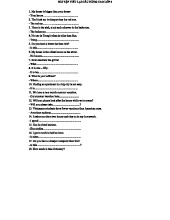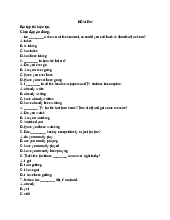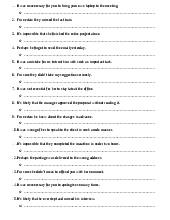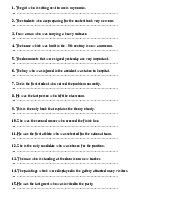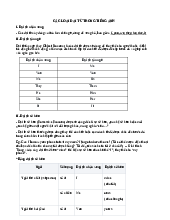Đang tải lên
Vui lòng đợi trong giây lát...
Preview text:
TIENG ANH 6 I-LEARN SMART WORLD
REVISION FOR THE MID-TERM TEST SEMESTER 2 ANSWER KEY
Ex 1. Choose the word whose underlined part is pronounced differently from the other three in each question. 1. A. trash B. station C. recycle D. plastic 2. A. shopping B. sugar C. sure D. fantastic 3. A. sad B. special C. decide D. police 4. A. exciting B. chess C. messy D. passion 5. A. glass B. ocean C. hospital D. campsite 6. A. protect B. throw C. flower D. soldier 7. A. pagoda B. comb C. sofa D. donate 8. A. know B. close C. town D. sofa 9. A. slow B. allow C. powder D. tower 10. A. cow B. show C. crown D. allow
Ex 2. Choose the word which has a different stress pattern from the others. 1. A. ‘listen B. ‘travel C. ‘borrow D. o’bey 2. A. ‘traffic B. a’gree C. ‘soldier D. ‘battle 3. A. ‘plastic B. ‘wildlife C. ma’chine D. ‘fiction 4. A. sug’gest B. ‘office C. ‘drama D. ‘army 5. A. ‘station B. be’come C. re’use D. pro’tect 6. A. ‘hiking B. ‘finish C. be’gin D. ‘study 7. A. ‘donate B. ‘patient C. ad’vice D. ‘rafting 8. A. ‘campsite B. ‘horror C. ‘story D. po’lice 9. A. ‘famous B. a’sleep C. ‘funny D. ‘boring 10. A. ‘happy B. a’fraid C. ‘boring D. ‘scary
Ex 3. Complete the conversations with the correct form of the adjectives in brackets.
1. Titanic is a moving movie. It has a sad ending, and everyone cries when watching it. (move)
2. Paul Walker won an Oscar for the best actor. (act)
3. This is a frightening movie. I was afraid when watching it. (frighten)
4. What an amazing actor! He makes the movie wonderful. (amaze) 1
5. Have you ever seen this comedy? It’s really funny. (fun)
6. The film is a big disappointment. It is boring from beginning to end. (disappoint)
7. Although La La Land is a romantic movie, it has a sad ending. (romance)
Ex 4. Write the correct past simple tense of “to be”.
1. Mom and Dad weren’t (not be) at home yesterday. They were (be) at the hospital.
2. The weather was (be) nice. It wasn’t (not be) windy and rainy.
3. Was (be) he free all day yesterday?
4. When were (be) you born?
5. He wasn’t (not be) at school. He was at home.
6. Were you busy yesterday? Yes, I was (be).
7. Was (be) it cold last night? No, it wasn’t (not be). It was hot.
8. Where were (be) they on Sunday? They were (be) at the store.
9. Were (be) Nina and Sam strong this morning? No, they weren’t (not be).
10. Was (be) Sam ill last night? Yes, he was (be).
Ex 5. Fill in the blank with a correct preposition in / on / at / Ø.
1. There was a loud noise which woke us up at midnight.
2. Do you usually eat chocolate eggs at Easter?
3. The trees here are really beautiful in the spring.
4. I’ll see you on Tuesday afternoon, then.
5. John is going to buy the presents today.
6. His daughter was born on the 24th of August.
7. Columbus sailed to the Americas in the 16th century.
8. Lucy is arriving on February the 13th at 8 o’clock in the morning.
9. I usually go to my parents’ house at Christmas. We eat turkey together on Christmas Day.
10. The train leaves tomorrow morning at 8.00 a.m.
Ex 6. Complete the paragraph with a / an / the / Ø.
I have arrived in (1) the USA last Monday. We left (2) Rome, flew over the Alps, and made
(3) a quick stop in London. There we went shopping at (4) Harrods, visited the Tower, and enjoyed
(5) a sunny afternoon in (6) Hyde Park. On (7) the following day, we left for New York. (8) The
time on board wasn’t boring as there were two films to watch on the monitor. (9) The people on the
plane were all (10) Italian. Before we landed at (11) JFK airport, we saw (12) the Statue of 2
Liberty, (13) Ellis Island, and the Empire State Building. (14) The hotel I stayed in was on the corner
of (15) 42nd Street and (16) 5th Avenue. I don’t like hotels very much, but I didn’t have time to rent an apartment.
Ex 7. Fill in the blank using the words in the box.
1. Don’t forget an umbrella with you. It’s raining.
2. Have a rest. You look tired.
3. Turn left at the end of the street.
4. Help me! I can’t swim!
5. Come in to take your passport.
6. Open your books at page 15.
7. Pass the salt, please.
8. Don’t listen to that record. It’s terrible.
9. Don’t be late! The train leaves at 8 o’clock.
10. Catch the first train in the morning.
Ex 8. Choose the correct preposition.
1. Don’t sit in / on / under this chair. It’s broken.
2. My grandma is sitting in / on / at the armchair on / next / beside the fireplace.
3. We live on / in / at an apartment on / at / into a very busy road.
4. I put my book in / on / over the table in / at / on the dining room.
5. There is a clock under / next to / above the teacher’s desk.
6. He always hides the key on / at / under the doormat.
7. Mary is sitting under / between / behind her parents. They are watching TV.
8. On a bus, passengers sit in front of / behind / between the drivers.
Ex 9. Complete the sentences with should/ shouldn’t/ can/ can’t and the verbs from the box.
1. This telephone is terrible. I can’t hear you at all.
2. Some robots can play musical instruments now.
3. You are ill, so you shouldn’t go to school today.
4. I’m afraid I can’t come to your party tonight.
5. The concert starts at 8:15, so we should meet at about 8.00.
6. If you try hard, you can pass your examinations.
7. My brother can cook very well. He is a chef in a French restaurant. 3
8. Children shouldn’t swim in that lake. It is not shallow enough.
9. Can you speak English fluently and quickly?
10. I’m right-handed. I can’t write with my left hand.
Ex 10. Read the passage and do the tasks below.
Marcus and Dani live in a small town. The town has a beautiful coast. But many people throw
garbage into the ocean and onto the beach. Now the coast is dirty. The environment is damaged. So
Marcus and Dani decided to clean up the garbage. They picked up trash in the sand and made the coast
clean again. Other people in the town saw this and want to help. They also picked up trash from the
coast. Then they picked up trash in the woods. There are now more birds in the woods and more
octopuses in the ocean. Marcus and Dani have saved their town’s environment!
a. Circle True or False.
1. Marcus and Dani’s town is near the ocean. True False
2. Many people throw garbage on the ground near the coast. True False
3. Marcus and Dani throw garbage in the woods. True False
4. The birds like to eat the trash in the woods. True False
5. No one helps Marcus and Dani clean up the environment. True False
b. Circle the correct answers.
1. Marcus and Dani decide to ______. A. help people feed birds B. throw trash in the woods C. clean the ocean D. pick up trash
2. What is true about Marcus and Dani? A. They have a pet bird. B. They live in a big city.
C. They found an octopus on the coast.
D. They found trash in the sand.
3. What do the other people in the town do?
A. They fish for octopus in the ocean.
B. They free birds into the woods.
C. They cleaned the coast and the woods. D. They do nothing.
4. What happened after the coast and woods were cleaned?
A. More octopus and birds came to live there.
B. The birds flew to another city.
C. The octopus moved to a different area.
D. There were no more animals in the woods.
Ex 11. Read the passage and answer the questions.
My favorite movie is “Tom and Jerry”. Tom is a cat with blue and white color. He keeps the
house for a normal family and has a very free life. His job is chasing Jerry day by day. Jerry is a brown 4
house mouse. He usually lives in the deep cave behind the wall. Although they hate each other so much
and always find ways to hurt the opponent, but when Tom or Jerry falls into really dangerous situations,
then both became another savior. The film is an endless confrontation between Tom and Jerry, bring
plenty of laughter for the audiences. I love this movie because when I watch it, I feel very glad, feeling
like returned to my childhood. 1. What’s Tom’s color?
Tom is a cat with blue and white color.
2. Does Tom usually live in a cage?
No, he has a very free life.
3. When will they help each other?
They will help each other when they fall into really dangerous situations.
4. How do the audiences feel when they watch “Tom and Jerry”?
“Tom and Jerry” brings plenty of laughter for the audiences.
5. Why does the writer love “Tom and Jerry”?
The writer loves “Tome and Jerry” because it makes he feels like returned to childhood.
Ex 12. Read and complete the statement. Niagara Falls
The Niagara Falls is located on the border between the United States and Canada. It is a group
of falls in the state of New York and the Canadian Province of Orlando. This group is the second largest
in the world in terms of volume of water flowing over its edge. It is the largest in North America. It is
a popular tourist destination.
The Niagara Falls was formed approximately 10,000 years ago when glaciers melted at the end
of the last ice age. Water from the Great Lakes carved a path of the Atlantic Ocean, formed the Niagara
River. The Niagara Falls is not very high, but it is very wide. The amount of water flowing over the
falls varies throughout the year. During season of high flow, usually springtime, more than 6 million
cubic feet (165,000 m3) of water passes over the falls per minute. The annual average flow rate is almost
4 million cubic feet (110,000 m3) per minute.
1. The Niagara Falls was formed approximately 10,000 years ago.
2. The Niagara Falls is the largest in North America.
3. Water from the Great Lakes formed the Niagara River.
4. During springtime more than 6 million cubic feet of water passes over the falls per minute.
5. The annual average flow rate is almost 110,000 m3 per minute. 5
Ex 13. Rewrite the following sentences, using the structure of imperative.
1. You should brush your teeth after meals.
Brush your teeth after meals.
2. You should not play soccer in the street.
Don’t play soccer in the street.
3. You should wash and iron your own clothes.
Wash and iron your own clothes.
4. You should not eat too much candy.
Don’t eat too much candy.
5. You should wash your hands before meals.
Wash your hands before meals.
6. You should not worry about the examination.
Don’t worry about the examination.
7. You should tidy your room every day.
Tidy your room every day.
8. You should not forget to write to your parents.
Don’t forget to write to your parents.
Ex 14. Write the second sentence, using should or shouldn’t and the words given.
1. Can’t they see the ‘No Smoking’ sign? (they / smoke / in here)
They shouldn’t smoke in here.
2. These windows are so dirty. (you / clean them / more often)
You should clean them more often.
3. We are in the library. (we / talk / too loudly)
We shouldn’t talk too loudly.
4. Suzy has to wake up early for school. (she / go to sleep / so late)
She shouldn’t go to bed so late.
5. You are always late for school. (you / be / punctual)
You should be punctual.
6. We’ll have an English test tomorrow. (you / learn your lessons / carefully)
You should learn your lessons carefully.
Ex 15. Use the words given and other words, complete the second sentence so that it has a similar
meaning to the first sentence. Do not change the word given. 6
1. It would be a good idea for you to go to a pagoda. (should)
I think you should go to a pagoda.
2. I advise you to travel in this summer to relax after a hard-working time. (should)
I think you should travel in this summer to relax after a hard-working time.
3. I advise you not to come to his birthday party. (should)
I think you should not come to his birthday party.
4. It’s not good to throw old clothes away. (You)
You should not throw old clothes away.
5. Remember to turn the tap off when you are brushing your teeth. (Don’t)
Don’t forget to turn the tap off when you are brushing your teeth.
6. My grandfather has to wear his glasses to read newspapers. (can’t)
My grandfather can’t read newspaper without wearing his glasses.
7. Running non-stop in 30 minutes is beyond her ability. (can’t)
She can’t run non-stop in 30 minutes. 7
